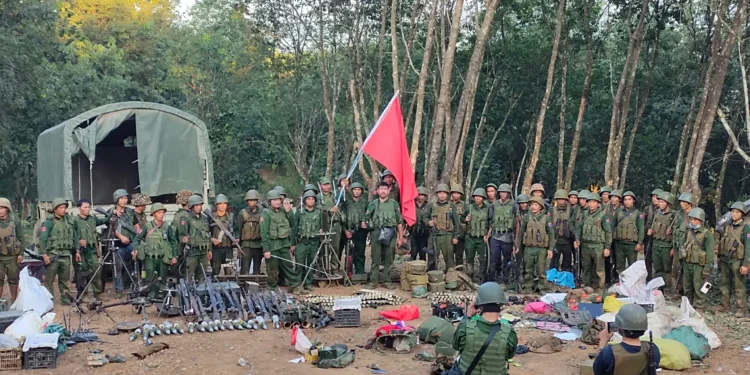Myanmar’s military regime is losing control over large parts of the country, especially along its borders, due to the advances of anti-coup forces and ethnic armed groups. According to a report by the Special Advisory Council for Myanmar (SAC-M), the conflict’s trajectory since 2022 has been one of “expanding resistance control versus corresponding military junta losses,” a trend that has accelerated since October 2023. In the wake of the February 2021 coup by Army chief Min Aung Hlaing, which ousted the elected government of Aung San Suu Kyi, mass protests evolved into armed rebellion after the military’s violent crackdown. The report notes that since the anti-coup forces, including ethnic armed groups and the People’s Defence Forces (PDF), launched Operation 1027 in October 2023, they have captured several military posts and border towns. These areas include regions along the borders with China, Thailand, Bangladesh, and India.
The SAC-M report states that the military regime has lost authority over townships covering 86 percent of Myanmar’s territory, home to 67 percent of the country’s 55 million people. The resistance to junta control remains strong and widespread. The report also challenges the legitimacy of the military government, asserting that it cannot uphold the core duties of a state due to its lack of control over the majority of the territory. The situation in townships with international borders highlights the junta’s weakened control. Of the 51 townships with international borders, only one, located in the foothills of the Himalayas with a population of 7,000, remains under stable junta control. In contrast, 30 townships are at least 90 percent controlled by anti-coup forces, with 14 of these fully under their control.
The SAC-M’s assessment aligns with findings from Crisis Group, a nonprofit organization tracking conflicts. Crisis Group’s report highlights that ethnic armed groups have been the main beneficiaries of recent developments, securing autonomous regions they have long sought. Richard Horsey, Crisis Group’s senior adviser on Myanmar, warns that these gains could complicate efforts to establish a future federal democracy, a key goal of the PDFs and the National Unity Government (NUG) that formed them. Horsey emphasizes the importance of international engagement with the various groups vying for power in Myanmar, considering the potential for increased conflict and human rights abuses. The SAC-M also calls for increased humanitarian assistance to civilians affected by the conflict. The United Nations estimates that more than three million people have been displaced due to the fighting. The SAC-M stresses the need for greater protection for civilians, pointing out that most violence is perpetrated by the military.
The junta has been accused of committing war crimes, including continued air attacks on civilian villages and the deliberate burning of homes. The SAC-M report states, “The junta is by far the primary source of violence and instability and grave violations of international human rights and humanitarian law.” The military shows no willingness to address the demands of the democratic revolution and remains committed to further violence and suppression.
Recent fighting has forced thousands to flee, with some crossing into Thailand. This mass displacement underscores the urgent need for a comprehensive response to the humanitarian crisis. The international community must address the escalating violence and instability in Myanmar, ensuring that aid reaches those in need and that efforts to establish peace and democracy are supported. In conclusion, the SAC-M and Crisis Group reports highlight the deteriorating control of Myanmar’s military regime in the face of advancing anti-coup forces and ethnic armed groups. The situation demands urgent international attention and action to address the resulting humanitarian crisis and to support the country’s path towards a stable and democratic future.
















